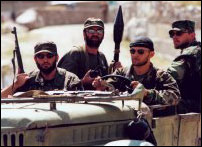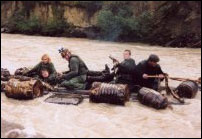“WAR”, Dir. by Alexei Balabanov (Russia, 2002)
The politically correct European has for a long time already considered Alexei Balabanov an out-and-out nationalist. The liberal public opinion in Russia is in agreement with this definition.
Both here and there the director of the film “War” is reproached with presenting only the Russian point of view on the conflict in Chechnya in the film. In the meantime, both there and here, the genre of the film is ignored for some reason.
Alexey Balabanov made “War” as a classical Western. The young Caucasian captive returns to Chechnya to rescue the bride (Ingeborga Dapkunaite) of the British fellow sufferer (Ian Kelly) and the injured and immobile Russian officer (Sergei Bodrov jr.). Overcoming numerous obstacles, Ivan releases the unfortunate woman and his friend, the commander.
The thematic diagram of a classical western (from “The Last of the Mohicans” up to, say, Boetticher’s “Comanche Station”) fits perfectly onto a situation of the Russo-Chechen conflict.
Carrying out his orders, Ivan behaves with the Chechens in the same way as the heroes of well-known American cowboy’s films behaved towards the native Indians. Undoubtedly, John Ford too was reproached with reactionism, but nowadays nobody would deny the obvious talent of this director.
On a professional level, in terms of precision and strength of his work as a director Balabanov has no equals in contemporary Russian cinema. However, “War” is attractive not only because of cinematic perfection.
This is perhaps the first film that shows that the world has changed; that obeying the laws of the above-mentioned political correctness will result in the destruction of Western civilization.
Ivan has won his war only because he talked to the enemy in the latter’s language. The Englishman, true to the traditions of the protection of any “oppressed minority”, naturally and logically acts in such a way that leaves the saviour of his bride appeared behind bars.
Once, in the Soviet Union, it was very important for us to understand that the majority is not always in the right. Now in the West people should assimilate that minorities are not always like the European Left would like to see them.
Balabanov’s “War” is about that.
See also the article “From Sochi to Moscow: DEBUTS, DEBUTS, DEBUTS…“.





